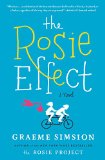Summary | Excerpt | Reading Guide | Reviews | Beyond the Book | Readalikes | Genres & Themes | Author Bio

ONE
Orange juice was not scheduled for Fridays. Although Rosie and I had abandoned the Standardized Meal System, resulting in an improvement in "spontaneity" at the expense of shopping time, food inventory, and wastage, we had agreed that each week should include three alcohol-free days. Without formal scheduling, this target proved difficult to achieve, as I had predicted. Rosie eventually saw the logic of my solution.
Fridays and Saturdays were obvious days on which to consume alcohol. Neither of us had classes on the weekend. We could sleep late and possibly have sex.
Sex was absolutely not allowed to be scheduled, at least not by explicit discussion, but I had become familiar with the sequence of events likely to precipitate it: a blueberry muffin from Blue Sky Bakery, a triple shot of espresso from Otha's, removal of my shirt, and my impersonation of Gregory Peck in the role of Atticus Finch in To Kill a Mockingbird. I had learned not to do all four in the same sequence on every occasion, as my intention would then be obvious. To provide an element of unpredictability, I settled on tossing a coin twice to select a component of the routine to delete.
I had placed a bottle of Elk Cove pinot gris in the refrigerator to accompany the divers' scallops purchased that morning at Chelsea Market, but when I returned after retrieving our laundry from the basement, there were two glasses of orange juice on the table. Orange juice was not compatible with the wine. Drinking it first would desensitize our taste buds to the slight residual sugar that was a feature of the pinot gris, thus creating an impression of sourness. Waiting until after we had finished the wine would also be unacceptable. Orange juice deteriorates rapidly—hence the emphasis placed by breakfast establishments on "freshly squeezed."
Rosie was in the bedroom, so not immediately available for discussion. In our apartment, there were nine possible combinations of locations for two people, of which six involved us being in different rooms. In our ideal apartment, as jointly specified prior to our arrival in New York, there would have been thirty-six possible combinations, arising from the bedroom, two studies, two bathrooms, and a living-room-kitchen. This reference apartment would have been located in Manhattan, close to the 1 or A train for access to Columbia University medical school, with water views and a balcony or rooftop barbecue area.
As our income consisted of one academic's salary, supplemented by two part-time cocktail-making jobs but reduced by Rosie's tuition fees, some compromise was required, and our apartment offered none of the specified features. We had given excessive weight to the Williamsburg location because our friends Isaac and Judy Esler lived there and had recommended it. There was no logical reason why a (then) forty-year-old professor of genetics and a thirty-year-old postgraduate medical student would be suited to the same neighborhood as a fifty-four-year-old psychiatrist and a fifty-two-year-old potter who had acquired their dwelling before prices escalated. The rent was high and the apartment had a number of faults that the management was reluctant to rectify. Currently the air-conditioning was failing to compensate for the exterior temperature of thirty-four degrees Celsius, which was within the expected range for Brooklyn in late June.
The reduction in room numbers, combined with marriage, meant I had been thrown into closer sustained proximity with another human being than ever before. Rosie's physical presence was a hugely positive outcome of the Wife Project, but after ten months and ten days of marriage I was still adapting to being a component of a couple. I sometimes spent longer in the bathroom than was strictly necessary.
I checked the date on my phone—definitely Friday, June 21. This was a better outcome than the scenario in which my brain had developed a fault that caused it to identify days incorrectly. But it confirmed a violation of the alcohol protocol.
An excerpt from The Rosie Effect, a novel by Graeme Simsion, reprinted with the permission of the author and Simon & Schuster. Visit www.RosieBooks.com for more information and to order your copy today.
Your guide toexceptional books
BookBrowse seeks out and recommends the best in contemporary fiction and nonfiction—books that not only engage and entertain but also deepen our understanding of ourselves and the world around us.